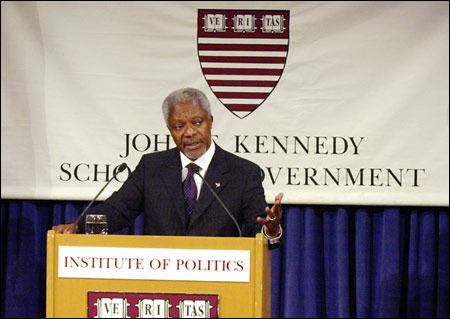Kofi Annan to speak at Afternoon Exercises
Nobel Peace Prize winner joins Harvard for its Commencement

“Kofi Annan is a distinguished statesman engaged in many of today’s most important global challenges,” said Harvard President Lawrence H. Summers. “We look forward with great anticipation to welcoming him to Harvard on Commencement day.”
Annan is the seventh secretary-general of the United Nations and the first to be elected from the ranks of UN staff. Beginning in 1962, he has held a succession of important posts within the UN system and has played significant roles in UN operations in Ethiopia, Iraq, and the former Yugoslavia. He served as assistant secretary-general for Peacekeeping Operations (1992-93) and as under-secretary-general (1993-96). Elected to his first term as secretary-general in 1997, Annan was elected to a second term in 2001 and will serve until 2006.
“Kofi Annan is respected throughout the world for his ongoing efforts to revitalize the United Nations,” said James V. Baker, president of the Harvard Alumni Association. “This is more important today than it ever has been, as is his continued role as an advocate of human rights and supporter of the universal values of equality, tolerance, and human dignity. His calm demeanor at times of crisis is something we have all come to respect.
We are indeed honored to welcome him as our Commencement speaker.”
Samuel Huntington, the Albert J. Weatherhead University Professor, who hosted Annan’s visit to Harvard in 1998, predicted that the secretary-general “will be an excellent Commencement speaker who thoroughly deserves an honorary degree from Harvard. Given the incredibly complex nature of the job, he has performed in an absolutely first-class fashion.”
John Ruggie, the Evron and Jeanne Kirkpatrick Professor of International Affairs
‘[Annan] is universally regarded as the most successful UN secretary-general since Dag Hammarskjold.’
– John Ruggie, Professor of International Affairs, Kennedy School of Government
at the Kennedy School of Government, who served as assistant secretary-general and chief adviser for strategic planning to Annan from 1997 to 2001, said that Annan “is universally regarded as the most successful UN secretary-general since Dag Hammarskjold. He has promoted extensive reforms in the structure and culture of the UN, pushed beyond the UN’s intergovernmental boundaries to engage the private sector and civil society in promoting the UN’s mission and work, and made sure that UN activities focus on and are assessed by their impact on the lives of people, especially in the poorest countries.”
Born in Kumasi, Ghana, in 1938, Annan studied at the University of Science and Technology in Kumasi and completed his undergraduate work in economics at Macalester College in St. Paul, Minn., in 1961. From 1961 to 1962, he pursued graduate work in economics at the Institut universitaire des hautes études internationales in Geneva. As a 1971-72 Sloan Fellow at the Massachusetts Institute of Technology, Annan received an M.S. in management.
Annan joined the United Nations system in 1962 and since then has played a variety of significant roles in the organization, including with the Office of the United Nations High Commissioner for Refugees in Geneva; as assistant secretary-general for human resources management and security coordinator for the UN system (1987-90); and as assistant secretary-general for Programme Planning, Budget and Finance, and Controller (1990-92).
As secretary-general, the soft-spoken Ghanaian has proved to be versatile, inventive, and unusually independent. The UN was close to bankruptcy when Annan assumed office. He vowed to shrink the operating budget of the organization at the same time as he asked for the $1.6 billion in back dues owed to the UN by the United States. Morale in the organization rose dramatically with Annan at the helm. He is admired for his formidable political talents but also for his willingness to work closely and collaboratively with his colleagues.
Other priorities for the secretary-general have been to strengthen the UN’s work in the maintenance of international peace and security; to encourage and advocate for human rights, the rule of law, and the universal values of equality, tolerance, and human dignity; and to restore public confidence in the organization by reaching out to new partners and, in his words, by “bringing the United Nations closer to the people.”
In April 2000, Annan issued a Millennium Report calling on member states to commit themselves to an action plan for ending poverty and inequality, improving education, reducing HIV/AIDS, safeguarding the environment, and protecting people from deadly conflict and violence. The report formed the basis of the Millennium Declaration adopted by heads of state and government at the Millennium Summit, held at UN Headquarters in September 2000.
Annan describes the HIV/AIDS epidemic as his personal priority, and, in April 2001, the secretary-general issued a five-point “Call to Action” to confront the crisis aggressively, proposing the establishment of a global fund to turn ideas into action.
On Dec. 10, 2001, the secretary-general and the United Nations received the Nobel Peace Prize. The Nobel Committee said Annan “had been pre-eminent in bringing new life to the organization.”
Like other Harvard Commencement speakers, Annan will speak during the Afternoon Exercises’ annual meeting of the Harvard Alumni Association.
Previous Commencement speakers include former U.S. Sen. Daniel Patrick Moynihan; former U.S. Treasury Secretary Robert Rubin; Alan Greenspan, chairman of the Board of Governors of the Federal Reserve System; Mary Robinson, the United Nations high commissioner for human rights and former president of the Republic of Ireland; and Ernesto Zedillo, former president of Mexico.




